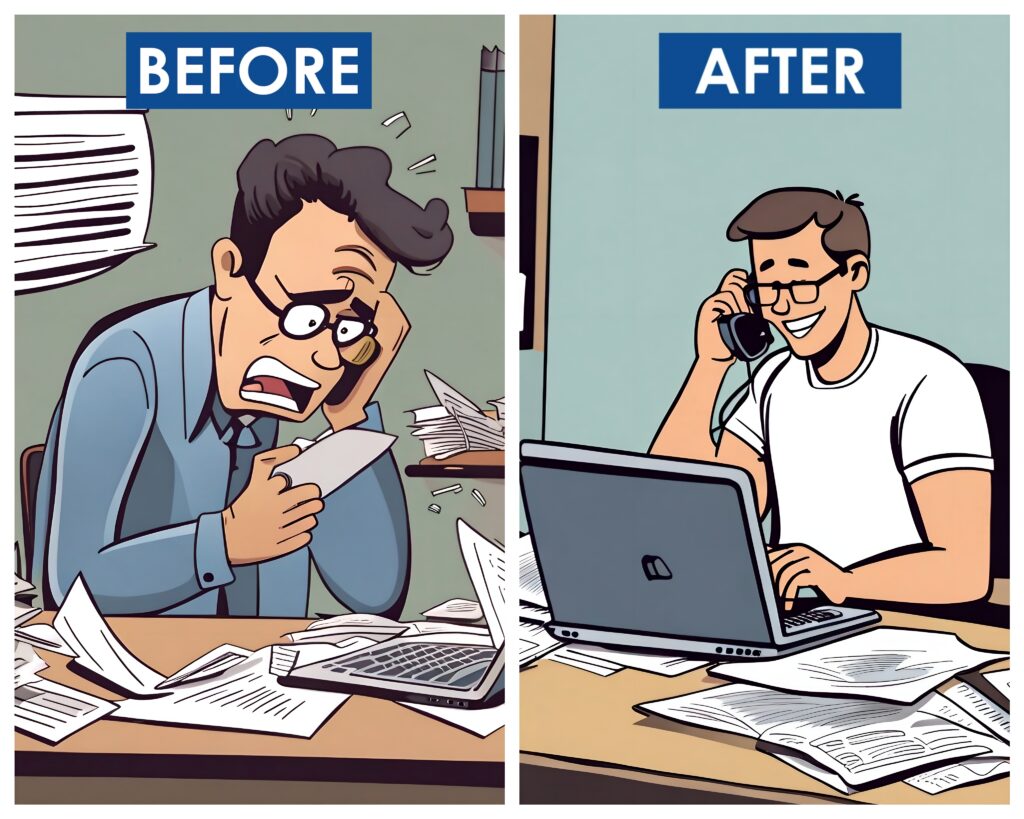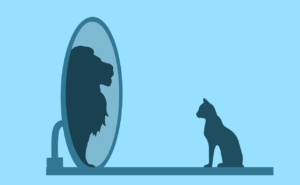In today’s fast-paced world, it can be difficult to stay on top of everything. But don’t worry, there are a few simple productivity hacks that can help you get more done in less time.
In this blog post, we’ll share five of our favorite productivity hacks that will help you have a highly efficient day.

What Is Productivity?
Being productive is not just about doing lots of stuff or checking things off a list. It means concentrating on doing the important stuff. Getting better at productivity might take time, so don’t worry. Just take one small positive step at a time.
The Importance of Being Productive
Being able to get things done efficiently and do good work is super important for doing well in your job and being happy in your life. People who can consistently produce high-quality work and do it at a steady pace can do better in their careers and feel happier overall.
Getting better at being productive means you can do more without having to work way harder or spend a ton of extra money. For example, in the US, businesses have been able to make nine times more stuff and provide services since 1947 without having to make their employees work a lot more hours.
Being productive also helps you know what tasks are most important, manage your time and resources wisely, and even gives you more free time for fun and enjoyable activities.
So, being productive is like a superpower that can help you achieve more and have a better life!
Master Your Day: 5 Productivity Hacks for Unstoppable Success in 2023
So here are five productivity hacks that can help you have a highly efficient day:
1. Prioritize your tasks:
Begin each day by identifying and prioritizing the most important tasks.
Use Eisenhower’s time management matrix to distinguish between urgent and important activities.
Focus on high-priority tasks that align with your goals and values to ensure you make progress on what truly matters.
Benefits of prioritizing tasks:
Prioritizing tasks is important because it helps you to focus on the most important things and avoid getting sidetracked.
When you have a clear sense of what is most important, you are more likely to stay on track and achieve your goals.
How to prioritize your tasks:
So now you understood that prioritizing task is very important to increase your productivity.
So how do you prioritize your tasks?
There are many different ways to prioritize tasks.
One common method is to use the Eisenhower Matrix.
The Eisenhower Matrix divides tasks into four quadrants:
- Quadrant 1: Urgent and important tasks. These are the tasks that need to be done right away and that have a high impact on your goals.
- Quadrant 2: Not urgent but important tasks. These are the tasks that don’t have to be done right away, but that are still important for your long-term goals.
- Quadrant 3: Urgent but not important tasks. These are the tasks that are time-sensitive, but that don’t have a high impact on your goals.
- Quadrant 4: Not urgent and not important tasks. These are the tasks that can be put off or eliminated altogether.
Once you have categorized your tasks, you can start to prioritize them.
The most important tasks are those in quadrant 1.
These are the tasks that need to be done right away and that have a high impact on your goals.You should focus on completing these tasks first.
The next most important tasks are those in quadrant 2.
These are the tasks that don’t have to be done right away, but that are still important for your long-term goals.
You should schedule some time each day to work on these tasks.
The tasks in quadrant 3 are the ones that you should try to eliminate or delegate to someone else.
These are the tasks that are time-sensitive, but that don’t have a high impact on your goals.
The tasks in quadrant 4 are the ones that you can put off indefinitely.
These are the tasks that are not important and that don’t have to be done right away.
Common mistakes people make when prioritizing tasks:
Here are some common mistakes people make when prioritizing tasks:
- Not prioritizing at all: This is the worst mistake you can make. If you don’t prioritize your tasks, you are more likely to get sidetracked and less likely to achieve your goals.
- Prioritizing based on urgency, not importance: Just because a task is urgent doesn’t mean it’s important. It’s important to prioritize tasks based on both urgency and importance.
- Trying to do too much at once: It’s better to focus on a few important tasks at a time than to try to do everything at once.
- Not reviewing your priorities regularly: Your priorities should change as your goals change. It’s important to review your priorities regularly to make sure they are still accurate and that you are on track to achieve your goals.
2. Practice proactive planning:
Take a few minutes each morning to plan your day ahead.
This will help you to:
- Save time and be more efficient.
- Stay on track and avoid procrastination.
- Achieve your goals.
- Reduce stress and anxiety.
How do I practice proactive planning?
There are many different ways to practice proactive planning.
One common method is to create a daily or weekly to-do list.
When you create a to-do list, you are essentially taking inventory of all the tasks that you need to complete. This will help you to see what needs to be done and prioritize your tasks accordingly.
Another way to practice proactive planning is to set deadlines for yourself.
Deadlines can help you to stay on track and avoid procrastination. When you have a deadline, you are more likely to focus on the task at hand and get it done.
Finally, you can also practice proactive planning by blocking out time in your schedule for specific tasks.
This can help you to avoid distractions and ensure that you have enough time to complete each task.
What are some common mistakes people make when practicing proactive planning?
Here are a few common mistakes people make when practicing proactive planning:
- Not being clear about their goals: It’s important to have clear goals when you are practicing proactive planning. Without clear goals, it’s easy to get sidetracked and lose focus.
- Not setting deadlines: Deadlines can help you to stay on track and avoid procrastination. If you don’t set deadlines, you are more likely to put off tasks until the last minute.
- Not blocking out time in their schedule: Blocking out time in your schedule for specific tasks can help you to avoid distractions and ensure that you have enough time to complete each task.
- Not reviewing their plan regularly: It’s important to review your plan regularly to make sure it’s still accurate and that you are on track to achieve your goals.
3. Use the power of focus:
Focusing on one task at a time can help you complete it quicker, more accurately, and with less stress.
When you achieve your goals, you will feel more satisfied with your work.
How do I improve my focus?
There are many different ways to improve your focus. Some common methods include:
- Setting goals and priorities: When you know what you need to achieve, it is easier to stay focused on your work.
- Eliminating distractions: This means turning off your phone, closing unnecessary tabs on your computer, and finding a quiet place to work.
- Taking breaks: It is important to take breaks throughout the day to avoid getting burned out. Get up and move around, or step outside for some fresh air.
- Practicing mindfulness: Mindfulness is the practice of paying attention to the present moment without judgment. It can help you to focus on your work and let go of distractions.
What are some common distractions that can hinder my focus?
There are many different distractions that can hinder your focus, including:
- Your phone: The constant stream of notifications can be a major distraction. Turn off your phone or put it away while you are working.
- Social media: It is easy to get sucked into scrolling through social media, but it can be a major productivity killer. Avoid checking social media while you are working.
- Email: Email can also be a major distraction. Check your email at set times throughout the day, and don’t let it interrupt your work.
- Unnecessary tasks: It is important to focus on the most important tasks first. Avoid getting sidetracked by unnecessary tasks.
- Physical discomfort: If you are not comfortable, it will be harder to focus. Make sure you are sitting in a comfortable position and that you have everything you need within reach.
How can I overcome distractions and stay focused on my work?
There are a few things you can do to overcome distractions and stay focused on your work:
- Identify your distractions: The first step is to identify the distractions that are most common for you. Once you know what your distractions are, you can start to develop strategies for overcoming them.
- Set boundaries: Let people know when you are working and that you don’t want to be disturbed. This could mean turning off your phone, closing your office door, or simply asking people to wait until you are finished before they interrupt you.
- Find a quiet place to work: If you can, find a quiet place where you can work without distractions. This could be a library, a coffee shop, or even just your own bedroom.
- Take breaks: It is important to take breaks throughout the day to avoid getting burned out. Get up and move around, or step outside for some fresh air.
- Reward yourself: When you are able to stay focused on your work, reward yourself with something you enjoy. This will help you to stay motivated and on track.
4. Incorporate regular breaks:
Avoid the trap of constant busyness by incorporating regular breaks into your schedule.
Research has shown that taking short breaks throughout the day can improve focus, creativity, mood, reduce stress, and improve overall productivity.
- Stay focused: When you work for long periods of time without taking a break, your focus starts to decline. Taking short breaks can help you to refresh your mind and come back to your work refreshed and more focused.
- Reduce stress: When you work for long periods of time without taking a break, you can start to feel stressed. Taking short breaks can help you to relax and de-stress, which can improve your overall productivity.
- Improve your mood: When you work for long periods of time without taking a break, you can start to feel tired and irritable. Taking short breaks can help you to improve your mood and make you feel more positive, which can also improve your productivity.
How often should I take breaks?
The amount of time you need to take a break will vary depending on the individual and the task you are working on.
However, most experts recommend taking a short break every 20-30 minutes.
What kind of breaks should I take?
There are many different types of breaks you can take.
Some people like to take a short walk, stretch, or get up and move around.
Others like to take a few minutes to relax and de-stress by reading, listening to music, or meditating.
The best type of break for you will depend on your individual preferences and the task you are working on.
However, it is important to take a break that allows you to relax and refresh your mind.
5. Practice self-care and renewal:
Self-care is the practice of taking care of your physical, mental, and emotional health. It is essential for productivity, as it allows you to rest, recharge, and come back to your work refreshed and motivated.
Why is self-care important for productivity?
When you take care of yourself, you are more likely to be able to focus on your work, be creative, and be productive.
When you are not taking care of yourself, you are more likely to be stressed, tired, and burned out. This can lead to decreased productivity and even health problems.
What are some ways to practice self-care?
There are many different ways to practice self-care. Some of the most common include:
- Getting enough sleep: When you are well-rested, you are more likely to be able to focus and be productive.
- Eating healthy foods: Eating healthy foods gives you the energy you need to power through your day.
- Exercising regularly: Exercise is a great way to reduce stress and improve your mood, both of which can help you be more productive.
- Taking breaks throughout the day: Getting up and moving around every 20-30 minutes can help you stay focused and avoid getting burned out.
- Spending time with loved ones: Social connection is important for your mental and emotional health.
- Doing things you enjoy: Make time for activities that you enjoy, whether it is reading, spending time in nature, or playing with your pet.


